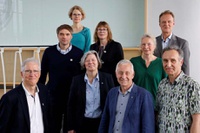Two Clusters of Excellence for the University of Freiburg
The German Research Foundation (DFG) will fund two University of Freiburg Clusters of Excellence starting on 1 January 2026. The existing Cluster of Excellence CIBSS will continue to receive funding. It will be joined by the new Cluster of Excellence Future Forests. Rector Kerstin Krieglstein: ‘The success of the Clusters of Excellence was made possible by top research performance, teamwork, and the strong synergies of Freiburg’s unique spectrum of disciplines.’
The University of Freiburg was successful with two Clusters of Excellence in the Excellence Strategy of the federal and state governments. The existing Cluster of Excellence CIBSS – Centre for Integrative Biological Signalling Studies will continue to receive funding for another seven years. In addition, the Cluster of Excellence Future Forests – Adapting Complex Social-ecological Forest Systems to Global Change will be established at the University of Freiburg on 1 January 2026. This was announced by the German Research Foundation and the German Science and Humanities Council on 22 May 2025. The two successful Clusters of Excellence are thus among the 70 clusters nationwide to be selected for seven years of funding. Altogether, 98 proposals were reviewed – 57 renewal proposals and 41 new proposals. A total of 539 million euros are available each year – three to ten million euros per Cluster of Excellence.
The University of Freiburg is therefore eligible to apply for the status of University of Excellence in the second funding line of the Excellence Strategy of the federal and state governments. The prerequisite for this is funding for at least two approved Clusters of Excellence. The Cluster of Excellence initiative Constitution as Practice in Times of Transformation (ConTrans) and the existing Cluster of Excellence livMatS will no longer receive funding.
Focus on application for University of Excellence status
‘It is an important and at the same time ambivalent day for us at the University of Freiburg: Two of our proposals were successful – that makes us very happy and proud. However, we also have to accept with disappointment that two proposals were not selected. I would like to congratulate and thank all researchers and staff who contributed to this success with their outstanding work. The funding serves as confirmation of the outstanding research that has already been conducted in the Clusters of Excellence in the past years. And what made this success possible in particular is the strong synergies of Freiburg’s unique spectrum of disciplines and our collaborative effort. This success is an important milestone: Our focus now lies on preparing our proposal to achieve University of Excellence status in a concerted effort including all status groups’, says Rector Prof. Dr. Kerstin Krieglstein. ‘My special thanks also goes to those whose projects were not successful today – I know how much dedication, expertise, and passion went into each and every proposal. As a researcher, I can understand how much a defeat of this kind hurts.’
Prof. Dr. Stefan Rensing, Vice Rector for Research and Innovation, emphasizes the societal relevance of the two Clusters of Excellence: ‘In the first funding period, the Clusters of Excellence demonstrated that they are developing new research approaches at the highest level that aim at possible solutions to pressing questions of our time. The renewal of the funding illustrates clearly how important it is to continue to make these approaches bear fruit. At this high level, it is often nuances that decide whether or not individual proposals are selected for funding. We’re convinced that the two teams that were not selected for funding are also top class and would like to explicitly thank the researchers and the staff that supported them for their outstanding work.’
Leading the way in signalling research
CIBSS has been developing approaches to meeting current global challenges in the areas of health and food security since 2019.
“The continued funding will allow us to further develop the field of signalling research in Freiburg and worldwide and to translate our discoveries into innovations with an even keener focus“, says Prof. Dr. Jürgen Kleine-Vehn, CIBSS Spokesperson.
‘With its unique research approach, CIBSS has elucidated fundamental biological signalling processes and developed innovative applications. Such approaches make it possible to identify the causes of diseases, develop new treatment methods, or make agriculture more sustainable. The continued funding will allow us to further develop the field of signalling research in Freiburg and worldwide and to translate our discoveries into innovations with an even keener focus. Thus, CIBSS is addressing pressing questions facing society in the areas of health and food security’, say CIBSS spokespersons Prof. Dr. Wolfgang Driever, Prof. Dr. Carola Hunte, Prof. Dr. Jürgen Kleine-Vehn, and designated CIBSS spokesperson Prof. Dr. Claudine Kraft.
Initiating far-reaching transformations
Future Forests aims to develop new paradigms for analysing forests as social-ecological systems. The objective of the cluster is to use these approaches to prepare the ground for a transformation towards more adaptive forests.
“We’re very pleased to be able to provide the basis for a transformation towards more adaptive forests with our concepts in the future“, says Prof. Dr. Jürgen Bauhus, Future Forests Spokesperson.
‘The funding means starting a new chapter in international forest research. We’re very pleased to be able to provide the basis for a transformation towards more adaptive forests with our concepts in the future’, say the spokespersons Prof. Dr. Jürgen Bauhus, Prof. Dr. Friederike Lang, and Prof. Dr. Marc Hanewinkel.
Link to original press release: https://uni-freiburg.de/en/university-of-freiburg-receives-two-clusters-of-excellence-and-aspires-to-university-of-excellence-status/
Contact:
Kerstin Steiger-Merx
Representative PR/Marketing
Faculty of Engineering
University of Freiburg
Tel.: 0761/203-8056
E-Mail: steiger-merx@tf.uni-freiburg.de

